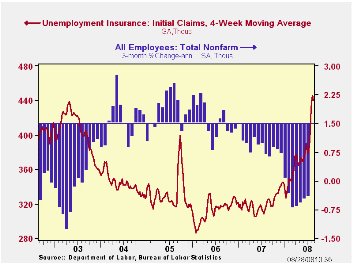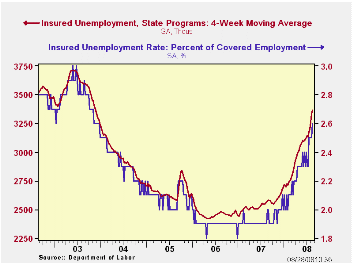 Global| Aug 28 2008
Global| Aug 28 2008U.S. Initial Unemployment Insurance Claims Dipped
by:Tom Moeller
|in:Economy in Brief
Summary
Initial claims for unemployment insurance dipped last week to an expected 425,000 from 435,000 during the prior week. The latest was the third decline in as many weeks. A program to locate people eligible for jobless benefits may have [...]

Initial claims for unemployment insurance dipped last week to an expected 425,000 from 435,000 during the prior week. The latest was the third decline in as many weeks.
A program to locate people eligible for jobless benefits may have continued to play a role in last week's elevated level of claims.
The four-week moving average dipped to 440,250 (35.6% y/y), the highest level since near the end of the 2001 recession 2001. During July claims averaged 393,000.
A claims level below 400,000 typically has been associated with growth in nonfarm payrolls. During the last ten years there has been a (negative) 76% correlation between the level of initial claims and the m/m change in nonfarm payroll employment. Over the longer period of time, the level of claims for jobless insurance has not trended higher with the size of the labor force due to a higher proportion of self-employed workers who are not eligible for benefits.
Continuing claims for unemployment insurance during the latest week jumped 64,000. The four-week moving average of continuing claims rose to 3,423,000 which was its highest level since late-2003.
Continuing claims provide some indication of workers' ability to find employment and they lag the initial claims figures by one week.
The insured rate of unemployment rose further to 2.6%, the highest level since late-2003.
Thoughts About the Phillips Curve is a paper presented by Paul A. Samuelson and it is available here.
| Unemployment Insurance (000s) | 08/23/08 | 08/16/08 | Y/Y | 2007 | 2006 | 2005 |
|---|---|---|---|---|---|---|
| Initial Claims | 425 | 435 | 28.0% | 322 | 313 | 331 |
| Continuing Claims | -- | 3,423 | 32.9% | 2,552 | 2,459 | 2,662 |
Tom Moeller
AuthorMore in Author Profile »Prior to joining Haver Analytics in 2000, Mr. Moeller worked as the Economist at Chancellor Capital Management from 1985 to 1999. There, he developed comprehensive economic forecasts and interpreted economic data for equity and fixed income portfolio managers. Also at Chancellor, Mr. Moeller worked as an equity analyst and was responsible for researching and rating companies in the economically sensitive automobile and housing industries for investment in Chancellor’s equity portfolio. Prior to joining Chancellor, Mr. Moeller was an Economist at Citibank from 1979 to 1984. He also analyzed pricing behavior in the metals industry for the Council on Wage and Price Stability in Washington, D.C. In 1999, Mr. Moeller received the award for most accurate forecast from the Forecasters' Club of New York. From 1990 to 1992 he was President of the New York Association for Business Economists. Mr. Moeller earned an M.B.A. in Finance from Fordham University, where he graduated in 1987. He holds a Bachelor of Arts in Economics from George Washington University.
More Economy in Brief
 Global| Feb 05 2026
Global| Feb 05 2026Charts of the Week: Balanced Policy, Resilient Data and AI Narratives
by:Andrew Cates






